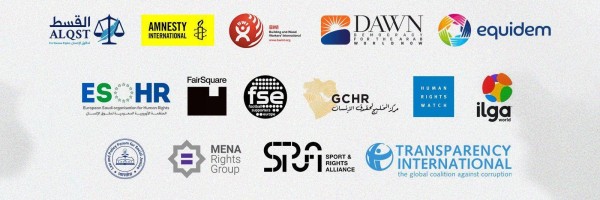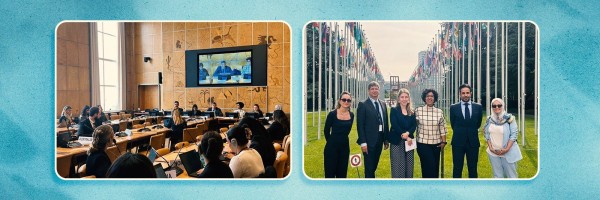On 22 January 2024, during Saudi Arabia’s fourth Universal Periodic Review (UPR), UN member states issued a long list of recommendations to address widespread and systematic rights violations in the kingdom, from the release of prisoners of conscience to abolition of the death penalty for minors, as well as a raft of legislative reforms. These recommendations, which have the potential to bring about significant change in the country, reflect input from human rights NGOs including ALQST, and we call on the Saudi authorities now to adopt and implement them.
Saudi Arabia has until the 56th UN Human Rights Council session in June-July to decide whether to accept or reject each of these recommendations. In its previous UPR, in 2018, Saudi Arabia formally accepted the bulk of the recommendations made, albeit with some notable exceptions. Yet despite the Saudi delegation’s claim in this latest UPR that the kingdom has implemented “80% of the total number” of the 2018 recommendations, in reality little to no progress has been made. Meanwhile, the human rights situation in Saudi Arabia has continued to deteriorate.
International human rights instruments and cooperation with the United Nations
More than 50 states called on Saudi Arabia to bring its domestic legislation into line with international human rights standards and to ratify key international human rights treaties. Notably, the Saudi authorities were recommended to ratify the International Covenant on Civil and Political Rights (ICCPR) and its second optional protocol; the International Covenant on Economic, Social and Cultural Rights (ICESCR); the International Convention for the Protection of All Persons from Enforced Disappearance (ICPPED); the International Convention on the Protection of the Rights of All Migrant Workers and Members of Their Families (ICMW); and the Optional Protocol to the Convention Against Torture (OP-CAT). Saudi Arabia accepted most of these recommendations when they were made in its previous UPR cycle, yet none of these treaties has yet been ratified. A number of states also recommended that Saudi Arabia extend invitations to, and accept visits from, UN special procedures mandate holders.
Domestic legal framework and the judiciary
Several states called for revisions to the repressive Law on Combating Crimes of Terrorism and its Financing (the Counter-Terrorism Law) and Anti-Cybercrime Law, including aligning the definition of terrorism with international standards and guaranteeing that the rights to freedom of expression, peaceful assembly and association are not criminalised, either offline or online. In practice, the Counter-Terrorism and Anti-Cybercrime Laws have been routinely weaponised to crack down on peaceful dissent, leading to the harsh sentencing of activists such as Salma al-Shehab and Abdulrahman al-Sadhan.
Several states recommended the implementation of judicial reforms and guarantees of legal safeguards. They called for reform of the kingdom’s criminal courts, which are notorious for their failure to respect due process and their lack of independence, and greater transparency in the judicial system. They recommended that the authorities restrict use of the Specialised Criminal Court to cases “properly defined as terrorism”, and ensure due process, fair trials, and protection from arbitrary and indefinite detention, torture and ill-treatment. A recommendation was also made to permit journalists and diplomats to attend trial hearings, which the authorities have denied since October 2018.
Freedom of expression, assembly and association
In light of Saudi Arabia’s sustained targeting of individuals, including independent civil society members and human rights defenders (HRDs), for peacefully exercising their basic rights, 10 states issued recommendations regarding protection of the right to freedom of expression, peaceful assembly and association. They urged the Saudi authorities to allow human rights NGOs to register and operate without fear of reprisals, and ensure that journalists and HRDs can work freely both online and offline.
Further calls were made for the authorities to release prisoners of conscience and repeal travel bans on HRDs who have completed their prison sentences, as well as to refrain from taking reprisals against HRDs who cooperate with UN mechanisms. Three states also recommended that Saudi Arabia’s national human rights institutions should meet the standards set out in the Paris Principles, in contrast to the way in which the Saudi Human Rights Commission is used by the authorities as a whitewashing tool.
Death penalty
In light of the Saudi kingdom’s prolific use of the death penalty, with at least 172 individuals executed in 2023, 19 states recommended a moratorium on the death penalty, with a view to its abolition. Significantly, 12 states called for its immediate abolition for crimes committed by persons under the age of 18, in line with the Convention on the Rights of the Child. Here, they were alluding to the Saudi authorities’ failure to deliver on what have proved to be false promises of reform in relation to the death penalty for juveniles. At least nine young men are currently at risk of execution in Saudi Arabia for crimes they allegedly committed as minors, in direct contradiction of official claims to have ended this violation of international human rights law.
Women’s rights
Ten states called for further legal reforms with regard to women’s rights, including abolition of the male guardianship system and the crime of “disobedience”, and the repeal of all provisions in the 2022 Personal Status Law (PSL) that discriminate against women and girls (including those relating to marriage, divorce and custody) and of the discriminatory provision regarding transfer of nationality in the kingdom’s citizenship law. Despite claims to the contrary, the Saudi authorities have not yet fully dismantled the male guardianship system but instead embedded much of it in the Personal Status Law. Meanwhile, the ability of a male guardian to take a woman to court for “disobedience” severely undermines the reforms that have been introduced. The PSL further endangers girls’ rights by allowing children to be married under the age of 18 in certain circumstances, prompting several states to recommend abolishing all exceptions to the prohibition on child marriage. Others also called for the criminalisation of gender-based violence, including marital rape, and for the definition of such violence to be extended beyond physical abuse alone.
Migrant rights, human trafficking and forced labour
More than 15 states issued recommendations in this area, including calls to close loopholes in recent reforms to the law, notably by including domestic workers in future reforms. The recommendations encompassed the need to strengthen the rights of foreign workers by reviewing the visa sponsorship system, removing exit visa requirements, and establishing effective complaints mechanisms for migrant workers. Two states also called for transparent investigations into the mass killings by Saudi forces of migrants and asylum seekers crossing the Yemen-Saudi border between March 2022 and June 2023.
ALQST’s Head of Monitoring and Advocacy Lina Alhathloul comments: “Guided by the input of civil society ahead of the UPR, the international community has made crystal clear the steps needed to improve Saudi Arabia’s dire human rights situation. The Saudi authorities must now accept these recommendations in good faith and work to implement them, so as to bring about genuine change for the benefit of the Saudi people – as well as the kingdom’s image internationally.”




